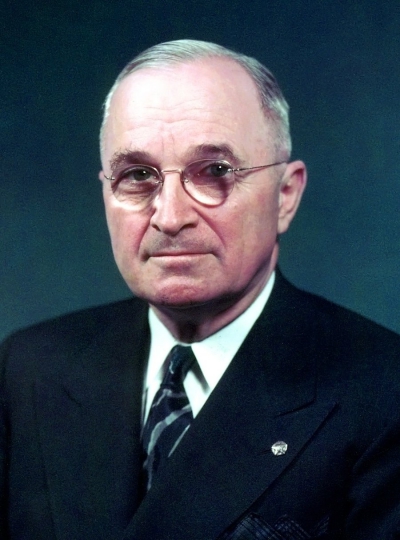Executive Order 9981 was issued on July 26, 1948, by President Harry S. Truman. This executive order abolished discrimination "on the basis of race, color, religion or national origin" in the United States Armed Forces, and led to the re-integration of the services during the Korean War (19501953). It was a crucial event in the post-World War II civil rights movement and a major achievement of Truman's presidency.
Harry S. Truman (May 8, 1884 – December 26, 1972) was the 33rd president of the United States, serving from 1945 to 1953. A lifetime member of the Democratic Party, he previously served as a US Senator from the State of Missouri from 1935 to 1945. He was chosen as incumbent President Franklin D. Roosevelt's running mate for the 1944 presidential election. Truman was inaugurated as vice-president in 1945 and served for less than three months until President Roosevelt died. Now serving as president, Truman implemented the Marshall Plan to rebuild the economy of Western Europe and established both the Truman Doctrine and NATO to contain the expansion of communism. He proposed numerous liberal domestic reforms, but few were enacted by the Conservative Coalition that dominated the Congress.
Truman grew up in Independence, Missouri, and during World War I fought in France as a captain in the Field Artillery. Returning home, he opened a haberdashery in Kansas City, Missouri, and was elected as a judge of Jackson County in 1922. Truman was elected to the United States Senate from Missouri in 1934 and gained national prominence as chairman of the Truman Committee, which was aimed at reducing waste and inefficiency in wartime contracts. Upon assuming the presidency, he was informed about the Manhattan Project. Truman authorized the first and only use of nuclear weapons in war against the Empire of Japan. Truman's administration engaged in an internationalist foreign policy by working closely with British Prime Minister Clement Attlee. Truman staunchly denounced isolationism. He energized the New Deal coalition during the 1948 presidential election and won a surprise victory against Thomas E. Dewey that secured his own presidential term.
After the onset of the Cold War, Truman oversaw the Berlin Airlift and Marshall Plan in 1948. When North Korea invaded South Korea in 1950, he lobbied for intervention from the United Nations in the Korean War. The Truman administration deployed forces in Korean War without congressional authorization and as the war stalemated his popularity fell. Domestically, his administration successfully guided the U.S. economy through the postwar economic challenges; the expected postwar depression never happened. In 1948, he proposed the first comprehensive civil rights legislation since Reconstruction. Congress failed to pass these measures which prompted Truman to issue Executive Orders 9980 and 9981 which ordered the desegregation of the armed forces and agencies of the federal government.
Corruption in the Truman administration became a central campaign issue in the 1952 presidential election. He was eligible for reelection in 1952, but with weak polls he decided not to run. Republican Dwight D. Eisenhower attacked Truman's record and won easily. Truman went into a retirement marked by the founding of his presidential library and the publication of his memoirs. It was long thought that his retirement years were financially difficult for Truman, resulting in Congress voting a pension for former presidents, but ample evidence eventually emerged that he amassed considerable wealth, some of it while still president. When he left office, Truman's administration was heavily criticized, though critical reassessment of his presidency has improved his reputation among historians and the general population.

1948Jul, 26
U.S. President Harry S. Truman signs Executive Order 9981, desegregating the military of the United States.
Choose Another Date
Events on 1948
- 3Apr
Marshall Plan
United States President Harry S. Truman signs the Marshall Plan, authorizing $5 billion in aid for 16 countries. - 14May
1948 Arab-Israeli War
Israel is declared to be an independent state and a provisional government is established. Immediately after the declaration, Israel is attacked by the neighboring Arab states, triggering the 1948 Arab-Israeli War. - 15May
1948 Arab-Israeli War
Following the expiration of The British Mandate for Palestine, the Kingdom of Egypt, Transjordan, Lebanon, Syria, Iraq and Saudi Arabia invade Israel thus starting the 1948 Arab-Israeli War. - 16Jul
1948 Arab-Israeli War
Following token resistance, the city of Nazareth, revered by Christians as the hometown of Jesus, capitulates to Israeli troops during Operation Dekel in the 1948 Arab-Israeli War. - 3Aug
Alger Hiss
Whittaker Chambers accuses Alger Hiss of being a communist and a spy for the Soviet Union.

 English
English  español
español  français
français  português
português  русский
русский  العربية
العربية  简体中文
简体中文 